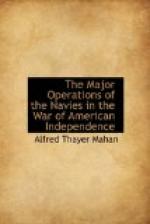It is somewhat difficult to criticise positively the conduct of Hood and of de Grasse in this affair. It is clear that Hood on the first day seriously sought action, though his force was but three-fourths that of his foe. He tried first to take the offensive, and, failing that, to induce his enemy to attack frankly and decisively. Troude is doubtless correct in saying that it was optional with de Grasse to bring on a general engagement; and the writer finds himself in agreement also with another French authority, Captain Chevalier, that “Count de Grasse seems to have been too much preoccupied with the safety of his convoy on the 29th, Admiral Hood having shown himself much less circumspect on that day than he was on the next. Notwithstanding our numerical superiority, Count de Grasse kept near the land until all the convoy were safe.” He represents Hood as fencing cautiously on the following day, keeping on the field, but avoiding a decisive encounter. This differs somewhat from the version of Hood himself, who mentions signalling a general chase to windward at 12.30 P.M. of the 30th. The two statements are not irreconcilable. Hood having coppered ships, had the speed of the French, whose vessels, being partly coppered and partly not, sailed unevenly. The British commander consequently could afford to take risks, and he therefore played with the enemy, watching for a chance. Hood was an officer of exceptional capacity, much in advance of his time. He thoroughly understood a watching game, and that an opportunity might offer to seize an advantage over part of the enemy, if the eagerness of pursuit, or any mishap, caused the French to separate. From any dilemma that ensued, the reserve of speed gave him a power of withdrawal, in relying upon which he was right. The present writer adopts here also Chevalier’s conclusion: “Admiral Hood evidently had the very great advantage over his enemy of commanding a squadron of coppered ships. Nevertheless, homage is due to his skill and to the confidence shown by him in his captains. If some of his ships had dropped behind through injuries received, he would have had to sacrifice them, or to fight a superior force.” This means that Hood for an adequate gain ran a great risk; that he thoroughly understood both the advantages and the disadvantages of his situation; and that he acted not only with great skill, but warily and boldly,—a rare combination. The British loss in this affair was 39 killed, including Captain Nott, of the Centaur, and 162 wounded. The French loss is given by Chevalier as 18 killed and 56 wounded; by Beatson, as 119 killed and 150 wounded.
Rodney, having collected his fleet, proceeded south, and on the 18th of May put into Barbados for water. Much anxiety had been felt at first for Santa Lucia, which Hood’s retreat had uncovered. As was feared, the French had attacked it at once, their fleet, with the exception of one or two ships, going there, and twelve hundred troops landing at Gros Ilet Bay; but the batteries on Pigeon Island, which Rodney had erected and manned, kept them at arms’ length. The works elsewhere being found too strong, the attempt was abandoned.




